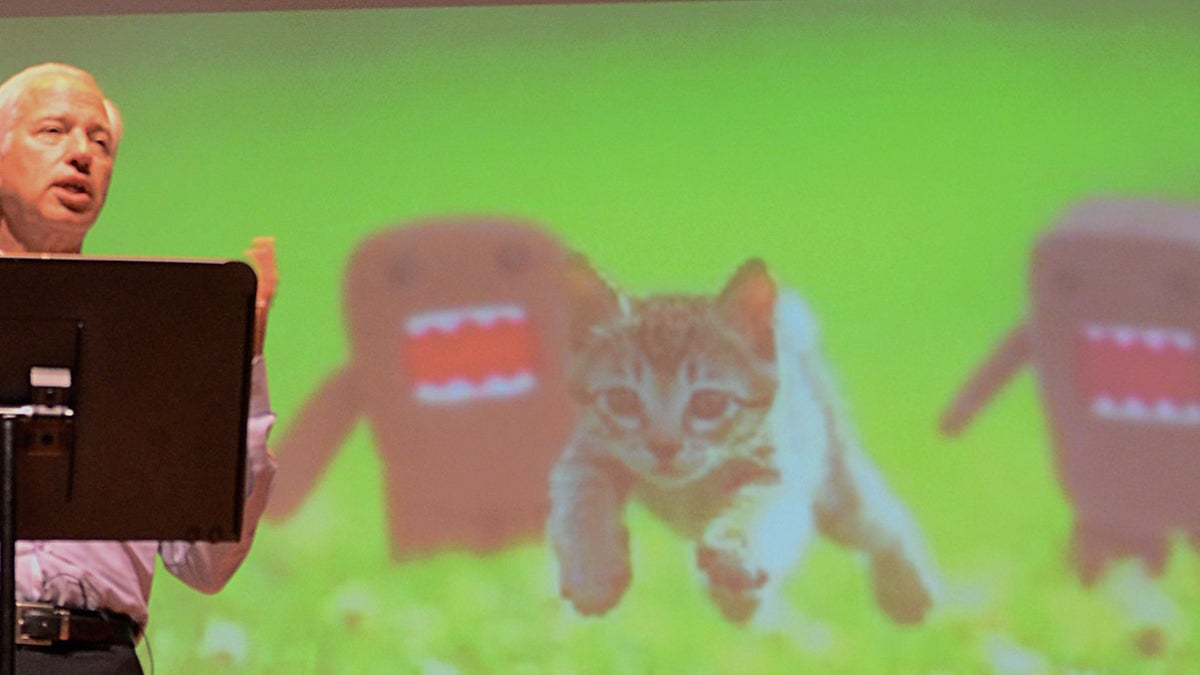RIAA CEO Cary Sherman walks into tech 'lion's den'
Sherman showed some guts by making a presentation at the Personal Democracy Forum, a conference filled with RIAA-hating tech types. He got some laughs and the crowd was polite, but he's got a long way to go to change the thinking of many music fans.

NEW YORK -- No one hooted or jeered when Cary Sherman took the stage today at the Personal Democracy Forum 2012.
That's worth noting, because Sherman is CEO of the Recording Industry Association of America, the trade group of the top four recording companies, and because the forum crowd was full of politically minded techies that -- it's safe to say -- feel some antipathy for the RIAA. OK, some of these people downright hate the RIAA.
All you have to do to measure the degree of animosity for the RIAA is read the user comments of any RIAA-related story at CNET or Ars Technica or Torrentfreak.
The bitter feelings began building up more than a decade ago, when Napster gave birth to file sharing. That resulted in the RIAA's controversial antipiracy campaign, which included litigation against individuals accused of looting songs. The large record companies also forced numerous popular file-sharing sites to close down. The RIAA now appears ready to offer an olive branch to music fans.
One reason the forum audience may have received Sherman relatively warmly was a request from forum organizers for people to be on their best behavior. A conference moderator suggested that Sherman deserved some credit for "walking into the lion's den."
Something else that may have contributed to the civility was how Sherman handled himself. He was entertaining. He poked fun at himself and his organization. Most importantly, he was direct about his group's history and goals.
Sherman started his presentation by showing a well-known photo of a roll of toilet paper with "RIAA" written on it. "We're not even sure that this is two ply," Sherman told the crowd.
When a technical glitch stalled his slide show for a while, he quipped: "I hope this isn't a conspiracy."
With Sherman stranded on stage for a few moments, some in the crowd couldn't help themselves: "Sing a song," one woman shouted. Sherman didn't miss a beat. He said he played piano as a child and may have made a name for himself on the bar mitzvah circuit.
Jokes aside, Sherman's main message was that the RIAA is evolving and that the music industry has responded to the advice offered over years by the tech sector. RIAA critics repeatedly told the big labels to evolve and adopt new technologies and business models. They said that the RIAA should drop litigation and quit hobbling music with Digital Rights Management software. According to Sherman, the RIAA has done all of that and more.
He said Spotify and Rhapsody offer unlimited streaming music. YouTube and Vevo provide free on-demand music videos. Pandora, the free and popular Web radio service, continues to increase its following. As for enforcement, Sherman said DRM is dead and reminded the audience that the RIAA abandoned the litigation campaign years ago.
He didn't shy away from talking about controversial subjects. He discussed the negotiated agreements that the RIAA came to with some of the country's largest Internet service providers. The participating ISPs are expected to start helping fight illegal file sharing later this summer. Sherman said the RIAA is working with advertisers, ISPs, credit card companies, and others to marginalize sites that traffic in pirated music.
This generated some murmuring within the crowd, especially when Sherman said the music industry is now half the size it was in 1999, the period leading up to the emergence of file sharing. "Illegal downloading has hurt us," Sherman said.
He conceded that piracy was likely not to blame for all of the damage, but he said there's no disputing that it contributed. Sherman also offered a new statistic. He said there are 41 percent fewer people describing themselves as musicians now then in 1999. This caused some in the crowd to snicker and shake their heads.
John Perry Barlow addressed the crowd via Skype following Sherman's presentation and disputed that statistic. Barlow, one of the founders of the Electronic Frontier Foundation, a group that advocates for Internet users and tech companies and is a longtime critic of the RIAA, said he believes more people than ever are earning a living from music because they don't have to deal with the labels.
Some in the audience applauded. Barlow added that the top labels are still trying to manufacture scarcity around music to help boost the value. "It won't work," he said.
By showing up at PDF, Sherman proved he's a capable speaker and possesses plenty of guts. But a friendly chat isn't going to scrub away all the distrust between the music and technology sectors. One person posed a question to Sherman via Twitter and it seemed to sum up the general thinking within the tech community about the RIAA.
"Your talk makes the RIAA sound reasonable and well considered," the questioner wrote. "Why do you think the RIAA is so vilified?"

